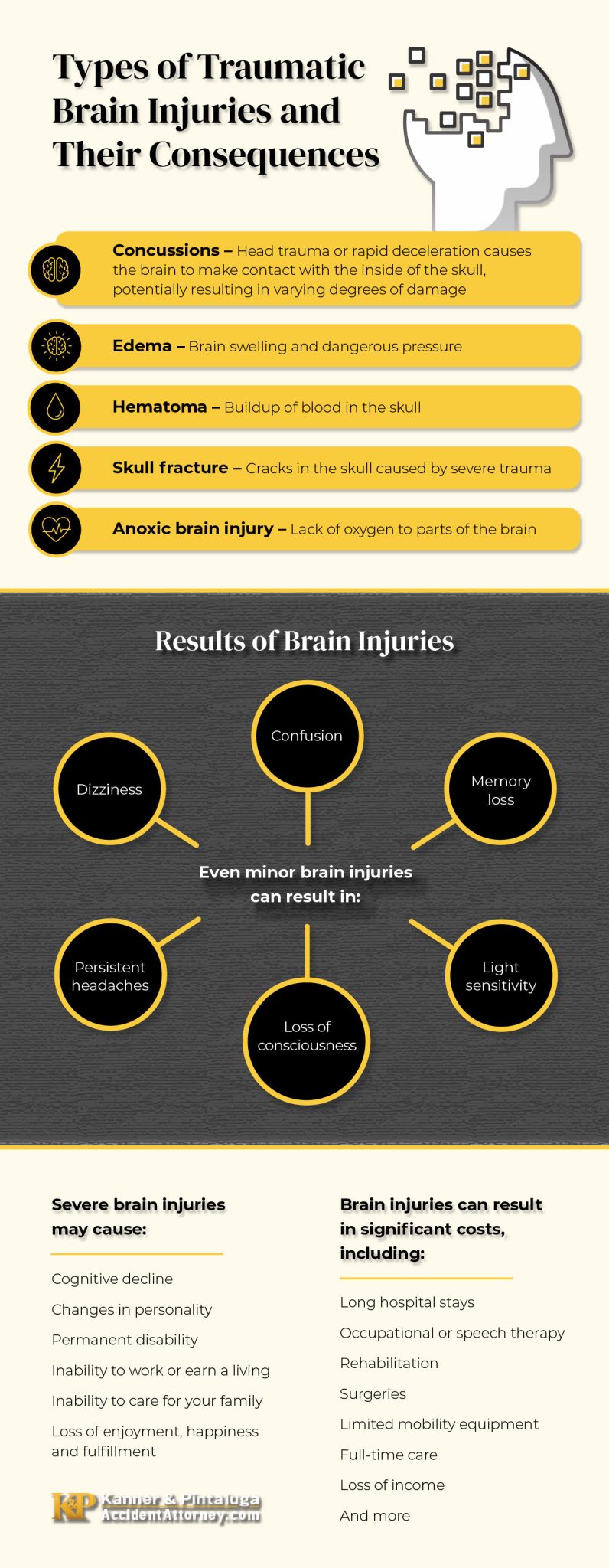
Verdicts & Settlements: Jury Concludes Company Was Beneficial Owner of Vehicle Involved in Drunk Driving Crash, Client Receives Additional $400,000
December 3, 2021
Verdicts & Settlements: $1.5M Settlement Reached in Rear-End Collision Case
December 8, 2021Types of Brain Injuries and Their Consequences

If you’ve been injured in a car crash or a workplace accident, one of the most daunting consequences you could face is a brain injury. Brain injuries vary from mild to serious or even life-threatening. Some injuries may heal within a few weeks or months, while others can have long-term repercussions like cognitive impairments and diminished quality of life.
Since brain injury symptoms aren’t always visible or obvious, it is important to seek medical attention as quickly as possible after an accident. A medical professional will be able to provide a diagnosis and a recovery plan for you to follow. Prompt treatment of head trauma is the best way prevent permanent damage.
Common Brain Injuries Caused by Auto Accidents, Slip and Falls and Workplace Negligence
Concussions
Concussions are one of the most common traumatic brain injuries. They are caused by impacts to the head or rapid jerking of the body that causes the brain to bounce back and forth in the skull. This can result in serious brain bruising.
Edema
Edema is the swelling of the brain that can occur because of a traumatic brain injury. Since the skull cannot expand to fit the swelling, edema can result in the brain being subjected to dangerous pressure that may cause lasting damage.
Hematoma
A hematoma is a buildup of blood in the skull. It can result from trauma like a car accident or hitting one’s head in a slip and fall.
Skull Fracture
A skull fracture can occur when an object hits the skull with powerful force. This could result from being hit with an object, falling and hitting the ground, injuring the head in a motor vehicle accident or any other type of severe trauma.
Anoxic Brain Injury
An anoxic brain injury happens when part of the brain is deprived of oxygen. Potential causes of this brain injury include cardiac arrest, near drowning and carbon monoxide poisoning.
How Workplace Negligence Can Lead to Accidents and Injuries
Employees working in construction, warehouses or factories with assembly lines and industrial machinery are often susceptible to work-related injuries. However, any employee regardless of their job title or work environment can become a victim of workplace negligence.
There are several things that could go wrong in a workplace. There are a nearly infinite number of ways a person could be injured at work, but some jobs and jobsites lead to more injuries than others. An employee may suffer a worksite accident if they:
- Slip or fall on wet surfaces
- Trip on loose carpeting or obstructions in walkways
- Are struck by falling, swinging or rolling objects
- Inhale toxic fumes like carbon monoxide
- Don’t have access to protective equipment when working with hazardous materials
- Work in poorly lit places
- Are victims of workplace violence
Consequences of a Brain Injury
Brain injuries can be tricky to detect. This is because they don’t always show obvious or visible physical symptoms. However, some signs and behaviors that may indicate a potential brain injury include loss of consciousness, dizziness, confusion, irritability, memory loss, sensitivity to light and persistent headaches.
If you’ve suffered a recent injury, pay close attention to how you feel and the symptoms you’re experiencing. When you recognize signs that could indicate a brain injury, deal with the problem immediately by going to the emergency room or urgent care. The sooner you are examined, the sooner treatment can begin, which can lead to fewer long-term issues.
A brain injury, especially one that’s left untreated, can lead to cognitive decline, personality changes and the inability to work and earn a living. You may suffer from chronic headaches or seizures which could make caring for your children or assisting around the house especially difficult. You may have ongoing medical care costs and experience a significant decline in the quality and enjoyment of your life.
Brain Injuries Can be Costly
Brain injuries can be particularly expensive to treat. Recovery might include a combination of long-term and costly speech, occupational and physical therapy. Unfortunately, insurance companies are slow to pay these types of costs and often attempt to fight catastrophic injury cases.
One of the fundamental roles personal injury attorneys play in the legal system is helping injured people get compensated for ongoing medical expenses. A personal injury lawyer will fight for you to get the compensation you rightfully deserve.


